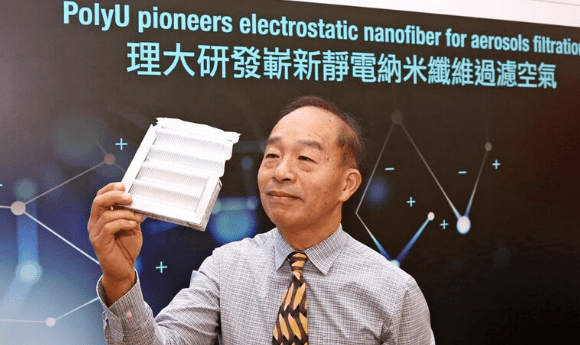Innovative nanofiber filter could be vital in the development of face masks and respirators

A nanofiber filter with numerous potential applications, including the production of protective face masks and in the enhancement of the western blot technique, has been created.
Developed by scientists at The Hong Kong Polytechnic University (PolyU; Hong Kong, China), an electrostatically charged nanofiber filter has been created that is able to filter nano-aerosols as small as 100nm. This characteristic confers the ability to filter viruses – which are common in that size range – as well as improving the efficacy of western blot.
Led by Wallace Woon-Fong Leung, the team utilized polyvinylidene fluoride (PVDF) – an inert semi-crystalline thermoplastic often used in electrical insulation – to create nanofiber filters. Aerosol capture was improved by electrostatically charging the nanofibers, thereby increasing electrical interaction with aerosols in close range.
The charged nanofiber filter demonstrated greater filtration efficiency for 100nm particles in comparison with a non-charged PVDF nanofiber filter – 54% vs 17%, respectively. The charged nanofiber filter also exhibited a 2.7-fold increase in the “quality factor”, which is calculated by the filtration efficiency over the pressure drop – also known as the benefit-to-cost ratio. The higher this ratio the better the performance of the filter.
The team improved the filter’s electrostatic performance by separating the nanofibers into several layers insulated with a separator, this reduced interference between fibers. Filtration tests carried out with two, three and four separator layers demonstrated an increased filtration efficiency of between 39—45% compared with filters used without a separator.
 Could our clothes tell us when we are ill?
Could our clothes tell us when we are ill?
A novel nanomaterial with the ability to detect slight changes in body temperature, could be woven into clothing to act as a wearable health monitor.
Durability tests demonstrated that, unlike other electrostatically charged nanofibers, PolyU’s nanofiber filter maintained electrostatic performance, meaning it has good durability and is potentially suitable for long term storage.
With the current COVID-19 outbreak, the need for face masks capable of effectively filtering airborne or aerosolized viruses is more important than ever. Viruses carry negative electrostatic charges, meaning the positively charged nanofiber filter would be effective for this application.
“The filter or face mask applying our innovation would, therefore, be an ideal defense against viruses during an outbreak,” commented Leung.
Due to its high binding capacity, a PVDF membrane is commonly used for the transfer of separated proteins in western blot. Applying PolyU’s electrostatically charged nanofiber filter can enhance protein capture by increasing the electrostatic force. This method can maintain the integrity of a protein without affecting its structure.
With its breathability, increased filtration and long shelf life, PolyU’s nanofiber filter represents an interesting development in nanofiltration technology. Leung was due to present on “filtration and purification nanofiber technologies for combating the novel coronavirus outbreak” at the 13th World Filtration Congress (20-24 April 2020, San Diego, CA, USA) before it’s postponement.





